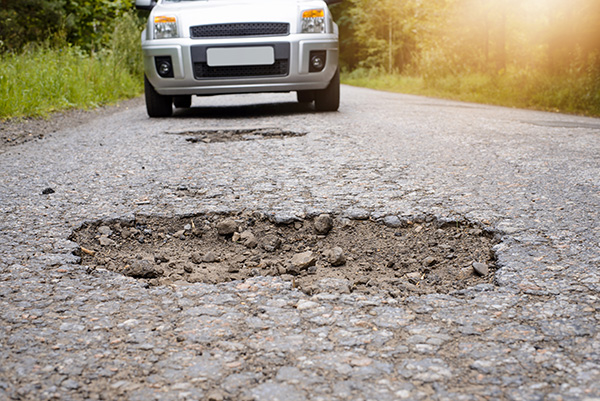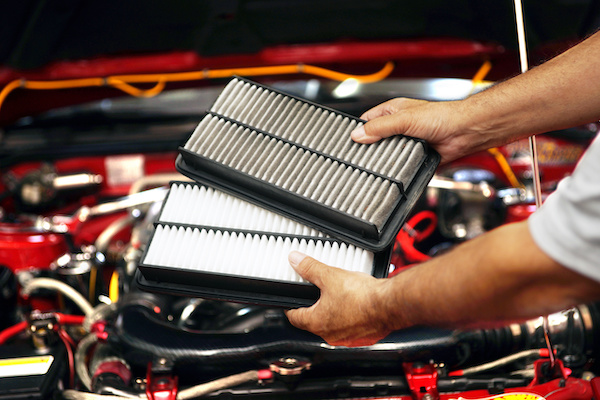Posted on 10/31/2024

Potholes are the hidden enemy of drivers everywhere. You may not even notice them until it’s too late, but that sudden thud can cause more damage to your car than you might realize. While they might seem like just another part of everyday driving, potholes have the potential to cause serious harm to various components of your vehicle, from your tires to your suspension and even your alignment. So, what exactly can that nasty pothole do to your car? Tires and Wheels Your tires and wheels are the first parts of your car that absorb the impact when you hit a pothole. The impact can lead to immediate damage, such as tire punctures or sidewall bulges, if the impact is severe enough. These issues may not seem like a big deal at first, but they can lead to dangerous blowouts while driving, especially at higher speeds. Wheels are also at risk. A hard hit from a pothole can bend or crack your rims, leading to air leaks or even a flat tire. You might notice a vibration ... read more
Posted on 10/23/2024

One of the most dreaded moments for any driver is seeing the check engine light suddenly appear on the dashboard. But what does it really mean? While it’s easy to feel overwhelmed, the check engine light is simply your car’s way of communicating that something is wrong. The actual issue could range from minor to serious. Understanding what the light indicates is the first step toward resolving the problem. Automotive Diagnostics Modern vehicles are equipped with an onboard diagnostic system (OBD-II) that monitors various components of your car. When something isn't functioning correctly, the system triggers the check engine light and stores a diagnostic trouble code (DTC). These codes can point to issues with anything from the engine and transmission to the exhaust system or fuel system. What Can Trip the Check Engine Light? Common causes of a check engine light in ... read more
Posted on 10/16/2024
.jpg)
Exhaust smoke can reveal a lot about your car's health. Some smoke may be normal, especially in cold weather. However, certain colors of exhaust smoke can indicate underlying issues that shouldn’t be ignored. Here’s what different exhaust smoke colors might mean for your car: White Smoke Thin, white smoke during start-up is usually harmless. It is caused by condensation in the exhaust. However, thick white smoke could signal a problem. If it continues while driving, it might indicate a coolant leak, a blown head gasket, cracked cylinder head or damaged engine block. You may see steam coming from your engine compartment and/or white smoke coming from your exhaust. These are serious cooling system issues that can lead to engine failure if left untreated. Blue or Gray Smoke Blue or gray smoke means your engine is burning oil. This cou ... read more
Posted on 10/9/2024

Mark recently visited Fox Run Auto to have automotive services taken care of for two different vehicles. He scheduled appointments in advance to ensure timely service and everything went smoothly. "My service at Fox Run Automotive on Thursday afternoon, September 10th was excellent in every way!" Mark says. "My two scheduled appointments for two vehicles were right on time, 2pm and 4pm. All of the staff was friendly, kind, professional, and very accommodating, as usual." Mark has been to Fox Run Auto before, so he knew he could rely on the team at our shop to provide the quality service he appreciates. Customer service is always our top priority, and it's repeat customers like Mark who show us we are doing a good job. We aim to create customers for life. If people are coming back r ... read more
Posted on 10/2/2024

The engine air filter plays a crucial role in maintaining your car’s overall performance and efficiency. It traps dirt, dust and debris. It prevents these contaminants from entering the engine and causing damage. Having a clean air filter will help ensure proper airflow, which helps your engine burn fuel efficiently. This will improve performance, prolong engine life and reduce emissions. Signs of Dirty or Damaged Air Filters Here are some of the common signs that you have a damaged or dirty air filter: Reduced Fuel Efficiency One of the most common signs of a dirty air filter is a noticeable drop in gas mileage. When your engine isn’t getting enough air, it compensates by burning more fuel. This ultimately will reduce fuel economy. U ... read more